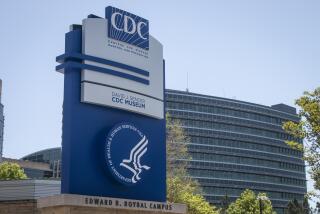Retirees Will Pay $5.30 Catastrophic Care Premium for 5 Months, Then Get Refund
- Share via
WASHINGTON — Medicare participants will pay $5.30 a month for the catastrophic care program for the first five months of next year, even though Congress repealed the program as of Jan. 1, Social Security officials said Monday.
The money--$26.50 per beneficiary, or an estimated $1.2 billion in all--will be refunded, but not before June, the officials said. And the refunds may be issued even later if the Treasury Department is swamped with income tax returns.
Computers are the culprit. Social Security Commissioner Gwendolyn S. King told a news conference that it would take five months to reprogram the agency’s computers to drop the $5.30 a month that the catastrophic care program had been expected to cost before Congress repealed it last month.
David Pryor (D-Ark.), chairman of the Senate Aging Committee, termed the situation “totally unacceptable. If we can send a man to the moon, we can certainly refund money before June.” He predicted “a firestorm of protest.”
The extra money, “paid month after month, can be critical to Americans on fixed incomes,” he said. “Although five bucks doesn’t seem like much inside the Washington Beltway, it means a great deal to the elderly and disabled.”
Pryor has assigned his staff to investigate whether there is a faster and cheaper way to straighten out the Medicare payments. King said the Social Security Administration would spend $35 million on computer work and $10 million to mail the refund checks. About 30 million Medicare recipients are covered by the catastrophic care program.
Until Congress repealed the catastrophic care program on Nov. 22, Medicare beneficiaries had been scheduled to pay $33.90 a month as of January. The premium is deducted from monthly Social Security checks.
Of that total, $28.60 was to pay for insurance coverage for doctor bills and $5.30 was to pay part of the cost of the catastrophic care program. King said the Social Security Administration could not reduce the deduction to its proper amount--$28.60--until it issues the June Social Security checks.
“Social Security will unscramble the egg, but we didn’t lay it,” King said. She said that her agency had told members of Congress on Oct. 3 that the deadline for changing the computer program was Oct. 24.
King said there were 276 “separate factors to be considered in reprogramming the computers,” making it impossible to complete the job before June.
“We feel terrible about the circumstances,” she said. “Five dollars can be groceries.” The Social Security Administration is “moving as quickly as we can,” said King, who has called a special meeting of computer experts from outside the government to offer suggestions.
Computer complexities make it inefficient to refund the money by simply increasing the size of Social Security checks after June, King said. It is easier, she said, for the Treasury Department to issue special refund checks.
She said she had talked with Treasury Department officials about when they can prepare the refund checks. “Our hope is that they will agree to start paying in June,” she said.
The premiums collected by Social Security would have financed about a third of the cost of the catastrophic care program, which offered unlimited hospital coverage after the patient paid for the first day, a limit on out-of-pocket spending for doctor bills and Medicare coverage of prescription drugs for the first time.
The bulk of the money to pay for the program was to have come from a controversial surtax paid by the 40% of Medicare beneficiaries who pay federal income taxes. The unpopularity of the special tax on people over 65 generated a vast political outcry, and Congress responded by repealing the law just 17 months after its enactment.
More to Read
Inside the business of entertainment
The Wide Shot brings you news, analysis and insights on everything from streaming wars to production — and what it all means for the future.
You may occasionally receive promotional content from the Los Angeles Times.










